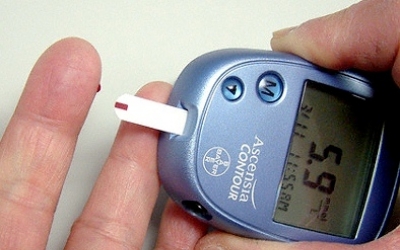- Latest news▼
-
15:11, April 24 Zombie deer disease possibly linked to hunters’ deaths

-
12:27, April 23 Appetite: Scientists found out the secret to the appeal of large portions of fast food

-
10:33, April 23 Scientists test new approach to fighting viruses

-
08:38, April 23 Ketamine may help with postpartum depression

-
22:12, April 22 Unhealthy amount of sugar found in baby food products of a well-known brand

-
19:41, April 22 Air pollution puts health of more than 1.6 billion workers globally at risk

-
17:25, April 22 Scientists found baked goods and lack of sleep to be more dangerous than alcohol

-
16:02, April 22 342 cases of measles recorded in Armenia so far in 2024

-
15:29, April 22 BrainStimulation: electrical brain stimulation alleviates anxiety and depression in the elderly

-
08:27, April 22 Cognitively stimulating jobs in midlife could lower dementia risk in old age, study finds

-
20:37, April 21 Environmental Health Perspectives: Microplastics ingested with food and water can spread from the gut to the brain

-
22:41, April 20 Scientists develop new method to safely stimulate immune cells to fight cancer

-
20:46, April 20 Blood test can determine who is at risk of developing multiple sclerosis - scientists

-
18:36, April 20 Next pandemic likely to be triggered by flu - scientists

-
12:16, April 19 Scientists grow human mini-lungs in lab

All materials
Is it possible to prevent type I diabetes?

Scientists at Saint Louis University have managed to stop the development of autoimmune reaction, that causes type I diabetes in an animal model.
The results of the study, conducted by Thomas Burris and his collegues was published in the journal Endocrinology. Type I diabetes occurs when the body’s immune system destroys insulin producing pancreatic beta cells, resulting in insulin deficiency and hyperglycemia. Current treatments for type I diabetes focus on controlling blood sugar with insulin therapy and must continue throughout a person’s life.
During the study specialists focused on the autoimmune process, proceded the disease, that destroys beta cells of pancreas. Scientists already knew that at least two types of immune “T-cells” contribute to the development of type I diabetes.
In this study, researchers found that two nuclear receptors play critical roles in the development of TH17 cells, and that by targeting these receptors, they were able to stop autoimmunity from developing in several mouse models, sparing beta cells.
The team blocked the receptors (ROR alpha and gamma t) with SR1001 (a selective ROR alpha and gamma t inverse agonist developed by scientists), significantly reducing diabetes in mice that were treated with it.
These results confirm that TH17 cells likely play a key role in the development of type I diabetes and suggest that the use of drugs that target this cell type may offer a new treatment for the illness.
Follow NEWS.am Medicine on Facebook and Twitter
- Video
- Event calendar
- Archive
- Most read
month
week
day
- JAMA Oncology: Urine test can help rule out high-grade prostate cancer with almost 100% accuracy, study shows 1257
- Daily Mail: Elderly woman in China gets infected with brain-eating amoeba 1201
- Scientists grow human mini-lungs in lab 1149
- Next pandemic likely to be triggered by flu - scientists 893
- Scientists found baked goods and lack of sleep to be more dangerous than alcohol 802
- 342 cases of measles recorded in Armenia so far in 2024 760
- Blood test can determine who is at risk of developing multiple sclerosis - scientists 741
- Scientists develop new method to safely stimulate immune cells to fight cancer 741
- Cognitively stimulating jobs in midlife could lower dementia risk in old age, study finds 725
- BrainStimulation: electrical brain stimulation alleviates anxiety and depression in the elderly 669
- Air pollution puts health of more than 1.6 billion workers globally at risk 539
- Unhealthy amount of sugar found in baby food products of a well-known brand 535
- Ketamine may help with postpartum depression 522
- Appetite: Scientists found out the secret to the appeal of large portions of fast food 519
- Scientists test new approach to fighting viruses 503
- Find us on Facebook
- Poll





